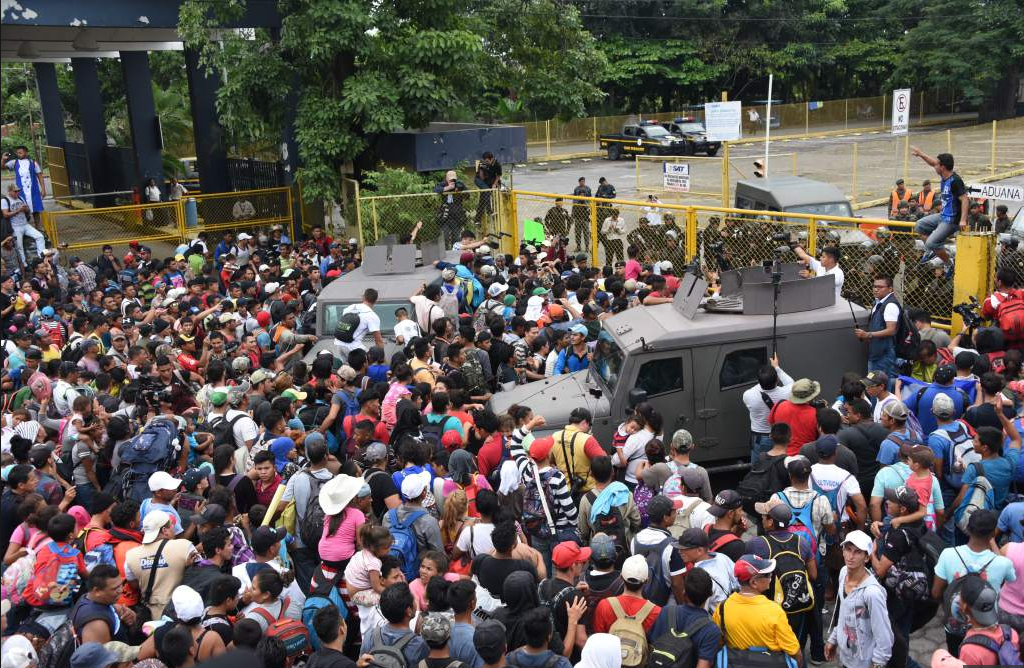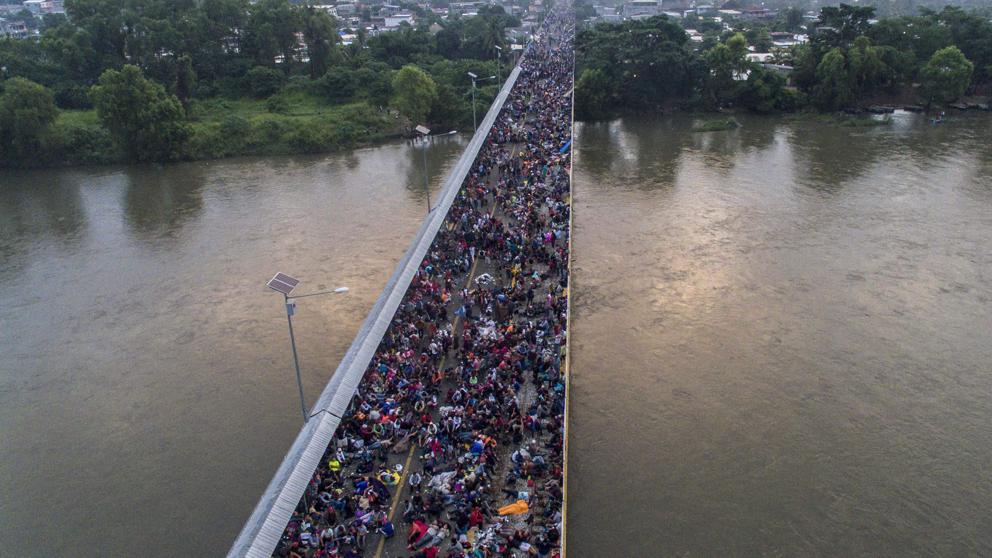
 Cubanet, Miriam Celaya, Havana, 24 October 2018 — The new Central America migratory wave that has resulted these days in violent actions at the Mexican southern border, where the migrants forced the official fence and invaded that country’s territory by force, is monopolizing the media’s attention and threatens to become the new crisis point of the already complex relations between the US and its southern neighbors.
Cubanet, Miriam Celaya, Havana, 24 October 2018 — The new Central America migratory wave that has resulted these days in violent actions at the Mexican southern border, where the migrants forced the official fence and invaded that country’s territory by force, is monopolizing the media’s attention and threatens to become the new crisis point of the already complex relations between the US and its southern neighbors.
This Monday, October 22nd, the US President has considered the advance of the migratory caravan as a “national emergency” and has warned about the possible use of armed forces, if necessary, to prevent the passage of illegal immigrants into US soil.
Simultaneously, as a response to the passivity of the governments of the region, which have not stopped the migrant movement, the US president has also announced, through his Twitter account, a cut or substantial reduction of the aid that Washington allocates to Honduras, El Salvador and Guatemala.
Meanwhile, social networks are a hotbed of debate these days, most of them moved by prevailing emotions. No one seems indifferent to the images of men, women and young children crossing vast distances, dragged into the uncertain adventure of a journey full of risks and hardships that is a hard experience even for any young adult. The fear reflected in the innocent faces, helpless victims of both the misery of their lives in their countries of origin and the manipulations of unscrupulous politicians and their parents’ irresponsibility, is truly moving.
And in the absence of coherent explanations or sufficiently verified information in the meantime, there has been growing speculation about the origin of this new migratory avalanche – organized and apparently led by certain characters in regional politics – which, like a stubborn herd, continues its march towards a destination, though it knows the doors will be closed. It is really hard to believe that so many people have spontaneously succumbed to what, by all accounts and beyond the real deprivations that afflict millions of the poor in Latin America, is revealed as a political maneuver.
As often happens behind each human drama, passions are polarized among those who ask to allow the caravan march to continue and be offered entry to the US, for humanitarian reasons, and those who are vertically opposed to the avalanche. The former invoke the human right to emigrate and find better living conditions, and appeal to their own experience as argument (“we were also immigrants, the US is a country built by immigrants”, etc.); while the latter point out the dangers of uncontrolled immigration, the overload that immigrants pose, as recipients of benefits that, in the long run, will affect taxpayers, etc. And, of course, there is no shortage of cries from xenophobes and racists, ready to put their poisonous note on the matter.

The worst part of the case, however, is that regardless of the reasons that everyone believes they have, there isn’t the slightest possibility of escaping this crisis. That is, there is no politically correct way to solve such a problem. Because allowing the passage of this migration wave not only creates a succession of crises in the economies of the host countries – where even without receiving this large a number of immigrants, numerous social ill exist for their nationals, such as unemployment and poverty – but it creates political tensions in the relations between these countries and in the relations between of all of them with the US.
On the other hand, if the US accepted such a situation and allowed entry to this (other) caravan, it would be setting a terrible precedent, since it would open the possibility that similar successive invasions would continue to become an unstoppable torrent.
Not even an economy as powerful as the one in the US could withstand such pressure or escape unharmed. This, without mentioning that it would open the doors to racial violence in the interior of the country, in a spiral of hatred from which nobody – neither nationals nor immigrants – would come out as winners, but quite the contrary.
The European experience with migrants from Syria and other nations involved in violent conflicts, which have entangled the political and social environment in that small continent, is a pattern that shows the economic as well as political consequences that such an uncontrolled and constant migratory flow that has ended up turning the borders into areas of tension can produce in the receiving countries. At the same time, they have been causes of social confrontations, of tensions in the relations between countries, and between the governed and governments.
Until now, the crisis arising from the heat of this migratory avalanche towards Europe shows no signs of ending, but continues to stir hatred and rejection in open confrontations with the most permissive and tolerant positions.
And it is also not possible to deny the impact that the clash of cultures produces when it happens massively and on a large geographical scale. Because, while we are in an era where everyone talks about “globalization” – on the basis of human solidarity, tolerance, respect for differences, etc. – the truth is that there is no ideal recipe that minimizes the adverse effects of what already seems more a phenomenon of continuous and infinite stampedes than a natural and gradual process of migrations, where cultural insertion and mutual enrichment takes place between those who emigrate and the society that welcomes them.

Without wishing to tilt the scales in favor to one or the other side, we must understand that the human right to emigrate cannot ignore the right of receiving nations to establish the rules of the game, to choose what immigrants and how many of them will be accepted in their country and how many will not, according to their own interests and the administration of their own economy and social order. No one allows the expedited entry into their home, or dispenses its resources to anyone who demands them just because of the decisions someone else makes.
And this brings us to another important point of the case in point: the current migration from Central America to the USA, the violence at the outposts of this human torrent, added to the demands that the US government be responsible for solving a problem they created, are elements that suggest the work of third parties, cleverly hidden behind the scenes.
There are those who say that it is a dirty maneuver plotted and managed by the villains of the region: the failed regimes of the Castro-Chávez alliance (Nicaragua, Venezuela and Cuba) with the intention of diverting the attention from public opinion and the forums of international organizations of the deep crisis in those countries, reflected in the growing migrations of millions of people who are fleeing, frightened by the trail of misery of “XXI Century Socialism”.
The truth is that these continuous avalanches from south to north – and always with only one final destination: the USA – are not plainly and simply explained as a result of the congenital poverty of our nations or as the always romantic dream of conquering the American dream; but as the sum total of the failure of the Castro regime experiment, expanded to the continent, and the manipulations of a defeated ideology that refuses to go away.
Because what all this convulsive and difficult scenario overlaps is the intention to create a crisis of great magnitude between North and South and not the vindication of the rights of the “exploited and dispossessed” peoples, which regional radical leftist ideologues so often proclaim. These are, in short, the dangerous throes of a twisted system that tried to conquer the continent and that now agonizes, victim of its own inefficiency. Possibly, the best thing for everyone would be to help it die.
Translated by Norma Whiting
